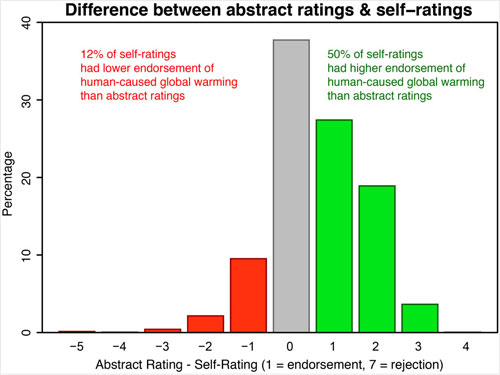
What The Science Says:
The 97% consensus on human-caused global warming is a result of two independent survey methods (volunteer abstract ratings and scientist self-ratings of full papers), and consistent with similar previous surveys. No significant accurate criticisms of the study have yet been advanced.
Climate Myth: The 97% consensus on human-caused global warming is a robust result
"That [97% consensus] survey has of course been substantially discredited ... 35 percent of the abstracts were misclassified, and they were classified to the pro-global warming side. Professor Richard Tol ... has disassociated himself from that and said it's not reliable." - Andrew Neil
A survey of over 12,000 peer-reviewed climate science papers by our citizen science team at Skeptical Science found a 97% consensus among papers taking a position on the cause of global warming in the peer-reviewed literature that humans are responsible. Not surprisingly, our results have been subject to attacks from those who would prefer to continue to deny the reality of the expert consensus on human-caused global warming.
For example, on Sunday July 14th, 2013, Andrew Neil hosted UK Energy and Climate Change Secretary Ed Davey on the BBC show Sunday Politics. Rather than discussing politics, Neil began the show by misrepresenting our consensus paper, making several false statements about it within the first 2 minutes of the show.
Neil has requested that people provide him with examples of the factual errors in this interview, and given that he began with errors in discussing our paper, we are happy to oblige. Here are his erroneous comments about our study:
"That [97% consensus] survey has of course been substantially discredited ... 35 percent of the abstracts were misclassified, and they were classified to the pro-global warming side. Professor Richard Tol ... has disassociated himself from that and said it's not reliable."
All of Neil's claims here refer to comments economist Richard Tol has made about our paper on his personal blog. He submitted those comments to the journal that published our paper, Environmental Research Letters, whose editor promptly rejected it. The editor noted that in addition to being "written in a rather opinionated style" and reading "more like a blog post than a scientific comment," "I do not see that the submission has identified any clear errors in the Cook et al. paper that would call its conclusions into question."
The claim that we "misclassified" 35 percent of abstracts is simply based on Tol's preference that a survey like ours be less precise and more general. Our team read and categorized every abstract based on what it said about the causes of global warming, whereas Tol believes that every paper discussing the impacts of climate change should be placed in the 'no opinion' category. We classified these abstracts correctly based on the categories established in our study. Tol believes the categories should be defined differently, and he is free to repeat our study with whatever categories he would like, but the claim that we misclassified these papers is factually wrong. Let's take one example:
"Humans are engaged in an uncontrolled experiment in planetary heating. Each decade, the concentration of CO2, methane and other greenhouse gases in the atmosphere is increasing by about 4%. All signs point toward unprecedented rates of warming and climate change." (Soule 1992)
In our survey, we classified this paper as an explicit endorsement of human-caused global warming. According to his categorization, Tol would have to classify it as 'no opinion'. You be the judge as to who's misclassifying abstracts.
Additionally, we didn't just rely on our abstract ratings. In a second phase of our study, we invited the scientists to rate their own complete papers. When we compared our abstract ratings to the author self-ratings based on the full papers, contrary to Neil's claim, we found that we had classified them more in the 'no opinion' category and less in the pro-human caused global warming categories than the authors themselves.

Histogram of Abstract Rating (expressed in percentages) minus Self-Rating. 1 = Explicit endorsement with quantification, 4 = No Expressed Position, 7 = Explicit rejection with quantification. Green bars are where self-ratings have a higher level of endorsement of AGW than the abstract rating. Red bars are where self-ratings have a lower level of endorsement of AGW than the abstract rating.
Regarding Neil's claim that Tol has disassociated himself from our study: Tol has never been associated with the analysis of our study. He was one of 29,083 authors of articles that we examined, and one of 1,200 authors who participated in the self-rating phase. So the statement that he has disassociated himself is meaningless. His opinions about how his own papers should be categorized are included in the 97 percent consensus in self-rated papers.
Those author self-ratings are a key component of our study and conclusions. In both the abstract ratings and author self-ratings, we found the same 97 percent consensus result. Tol has only criticized the abstract ratings survey; even if you disregard those results, the 97 percent self-ratings consensus remains.
Percentage of papers endorsing the consensus among only papers that express a position endorsing or rejecting the consensus. From Cook et al. (2013).
This is why our results remain widely accepted. Neil's assertion that they have been "widely discredited" is simply a repetition of baseless claims made on climate contrarian blogs. If Neil relies on contrarian blogs for his climate information, that may explain why he is woefully misinformed on the subject.
 |
The Skeptical Science website by Skeptical Science is licensed under a Creative Commons Attribution 3.0 Unported License. |